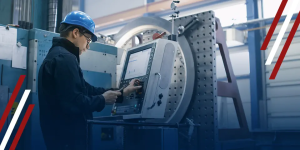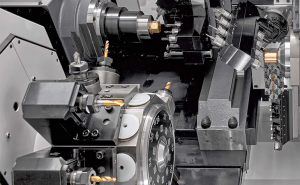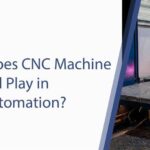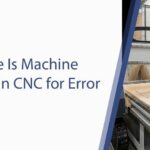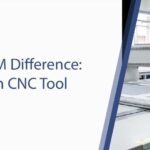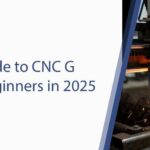CNC Machines Ready for the Future: Industrial Revolution and Technological Innovations
CNC (Computer Numerical Control) machines are one of the cornerstones of modern industrial production processes.
The evolution of CNC machines has not been limited to precision and efficiency but has also integrated new technologies to make production processes smarter and more connected.
Future-Ready CNC Machines are designed to leverage the opportunities offered by Industry 4.0 to provide faster, more flexible, reliable, and efficient production processes.
This article will comprehensively explore the key features, applications, challenges, and industrial innovations related to CNC machines prepared for the future.
1. Definition and Key Features of CNC Machines Ready for the Future
CNC machines ready for the future can be defined as machines capable of integrating advanced technologies such as digitalization, automation, artificial intelligence, IoT (Internet of Things), and data analytics, which differ from traditional manufacturing techniques.
These machines excel in data collection, analysis, decision-making, and process improvement.
Key Features:
- Connected Systems and IoT Integration: CNC machines communicate with other machines and systems on the production line to share data. This feature enables the monitoring of machine status remotely and optimizing processes using real-time data.
- Artificial Intelligence and Machine Learning: AI and machine learning algorithms optimize production processes by analyzing them. Machine learning allows machines to improve themselves over time.
- Adaptable and Flexible Manufacturing: CNC machines ready for the future can quickly adapt to production processes and facilitate the creation of flexible production lines. These machines are particularly well-suited for transitioning between different types of parts production.
- Data-Driven Decision Making: These machines offer intelligence-based systems that analyze production data and provide decisions that improve efficiency.
2. The Impact of Industry 4.0 on CNC Machines
Industry 4.0 is centered around digitalization, automation, and data-driven management systems in production.
CNC machines are undergoing a significant transformation with this revolutionary change, becoming more integrated, efficient, and flexible.
The effects of Industry 4.0 on CNC machines can be summarized as follows:
a. Connected Manufacturing through IoT
IoT enables machines to exchange data with each other and centralized systems. CNC machines provide continuous status updates via sensors. These machines transmit production data to cloud systems in real-time, enabling quick responses in case of malfunctions or productivity loss. Furthermore, inter-machine communication allows the entire production process to be monitored and analyzed.
b. Artificial Intelligence and Machine Learning Applications
CNC machines ready for the future use AI and ML algorithms to analyze their own performance and predict future performance. These algorithms use historical data to determine optimal machine parameters and make adjustments to optimize the production process. For example, tool path optimization, speed improvements, and vibration analysis can be done using these technologies.
c. Digital Twins for Simulation and Modeling
Digital twins are virtual replicas of real machines used for simulating their operating conditions. Digital twins of CNC machines can detect potential faults, efficiency losses, and errors at early stages. This virtual modeling allows testing to be done at a lower cost compared to physical machines and enhances the safety of production processes.
3. Industrial Applications of CNC Machines Ready for the Future
CNC machines ready for the future are effectively used in various industries to increase efficiency, reduce costs, and optimize production processes.
a. Automotive Industry Applications
The automotive industry greatly benefits from CNC machines, which meet the high-volume and high-quality production requirements. CNC machines ready for the future enable faster prototyping and high-precision mass production of automotive parts. Furthermore, AI and IoT integration minimize production errors in automotive parts.
b. Aerospace and Defense Industry Applications
The aerospace and defense industries require CNC machines that meet high precision and security standards. CNC machines ready for the future can make the production of critical components in these sectors more efficient and error-free. Digital twin technology allows testing in the design phase, minimizing production errors during manufacturing.
c. Medical Industry Applications
Medical device manufacturing requires precision and reliability. CNC machines ready for the future ensure the production of medical devices with higher accuracy. Additionally, machines equipped with sensors continuously monitor the quality of devices during production and optimize quality control processes.
4. Challenges Faced by CNC Machines Ready for the Future
Although CNC machines ready for the future offer many advantages, several challenges may arise when using these machines effectively.
a. Data Management and Integration Challenges
The large volume of data generated by CNC machines can become excessively complex if not properly managed. Collecting, storing, analyzing, and integrating this data with other systems can be a significant challenge. Cloud-based solutions and data integration software must be used to store and analyze data on a unified platform.
b. High Initial Costs
Next-generation CNC machines are generally more expensive than traditional models. These high costs may deter small-scale businesses from investing in these technologies. However, over the long term, lower maintenance costs and increased efficiency make these machines economically attractive.
c. Workforce and Training Requirements
To operate next-generation CNC machines efficiently, a highly skilled workforce is necessary. Engineers must be trained in advanced technologies such as machine learning, AI, and IoT. Therefore, businesses must invest in employee training to ensure the successful deployment of these technologies.
Conclusion
CNC machines ready for the future are bringing about a revolutionary change in the manufacturing industry.
Combined with the innovations of Industry 4.0, these machines make it possible to achieve faster, more efficient, and cost-effective production processes.
However, overcoming the challenges associated with their integration requires addressing proper data management, appropriate training, and infrastructure investments.
In the future, CNC machines will become smarter, more connected, and more efficient, playing a significant role in shaping production processes.
Contact Us:
- E-Mail: info@radonix.com
- Phone: +90 (553) 920 5500



